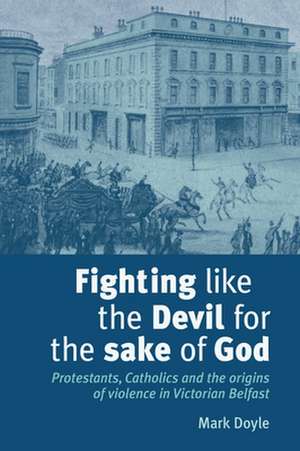Fighting Like the Devil for the Sake of God
Autor Mark Doyleen Limba Engleză Hardback – apr 2009
Preț: 499.58 lei
Preț vechi: 658.32 lei
-24% Nou
Puncte Express: 749
Preț estimativ în valută:
95.61€ • 99.45$ • 78.93£
95.61€ • 99.45$ • 78.93£
Carte indisponibilă temporar
Doresc să fiu notificat când acest titlu va fi disponibil:
Se trimite...
Preluare comenzi: 021 569.72.76
Specificații
ISBN-13: 9780719079528
ISBN-10: 0719079527
Pagini: 296
Dimensiuni: 157 x 234 x 28 mm
Greutate: 0.59 kg
Editura: MANCHESTER UNIVERSITY PRESS
ISBN-10: 0719079527
Pagini: 296
Dimensiuni: 157 x 234 x 28 mm
Greutate: 0.59 kg
Editura: MANCHESTER UNIVERSITY PRESS
Notă biografică
Mark Doyle is an Assistant Professor at Middle Tennessee State University
Cuprins
List of maps and illustrations
Acknowledgements
List of abbreviations
Introduction.
1. Defending the faith: evangelicalism and anti-Catholicism
2. Belfast Catholics: 'a mere incohesive heap'
3. An unenviable notoriety: the 1857 riots
4. Local government and Catholic alienation
5. The idea of order: Dublin Castle and Belfast Protestants
6. The city erupts: August 1864
7. Glasgow: sectarian détente
8. Memories of violence, 1864-1886
Epilogue
Appendix: 1864 riot ballads
Bibliography
Index
Descriere
A work about Belfast in the middle of the nineteenth century. It looks at how and why Ireland's most prosperous and industrialized town began to tear itself apart. It tells that through a series of steadily escalating riots, working-class Protestants and Catholics forged a tradition of violence that profoundly shaped their own identities.
